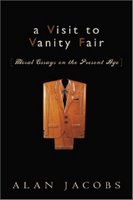A collection of thoughtful essays-- sometimes humorous, frequently insightful. Some essays are inspired by particular books and others by personal experience (such as a young son eating paper torn from a Bible), but Jacobs always moves from these starting points towards deeper and more significant issues so that a review of a historical study of children's Bibles addresses our modern perceptions of children's spirituality, and whether editors of children's Bibles are justified in editing out violent and racy stories (other than the violence of the cross, of course, which is generally portrayed in some fashion). The essays range from personal experiences of fear and death to musings on such personages as C. S. Lewis, Bob Dylan, and Harry Potter, among other topics. Throughout, the essays are entertaining, readable, and thought-provoking.
A few favorites that particularly stood out, for some reason or another:
In "Dowsing in Scripture," when his two-year-old son eats paper from the Bible, Jacobs muses on the common, deprecated habit of opening the Bible at random as a kind of prophecy-- and finds himself unable to resist attempting to interpret his own son's act of eating scripture, with resonances of the prophets who were fed scrolls.
"In on the Kill" addresses the preponderance of violence in animal and nature shows and points out our society's preoccupation with, and entertainment by, death-- and even suggests that by watching we participate in this. In "Friendship and its Discontents," a review of an anthology of writing about friendship becomes an occasion to delve into what does and does not constitute true friendship, along with the question of whether friends must share spiritual beliefs.
"Lewis at 100" addresses the evangelical appropriation of C. S. Lewis as almost a saint, and the oddities that this has brought with it (such as a refusal by some to believe that Lewis consummated his marriage with Joy Gresham, as if Lewis must be 'pure' according to evangelical standards-- even though he was also known as a drinker and smoker, which such people happily ignore). One interesting point: Lewis did not think he was, or intend to be, original. He merely tried to articulate Christian views in a way that people of his time period could understand, and he did not expect his work to last. Jacob raises the question, why have there not been other writers and thinkers who might supersede Lewis by articulating these same points in a new way, for a new age?
"Harry Potter's Magic" is an insightful response to the mixed reception of the popular books in evangelical circles. Jacobs describes Rowling as a "world-maker" akin to Tolkien, and goes on to address ideas of magic in comparison to technology and science. He also makes a point that I have often thought myself-- many evangelicals condemn as "dangerous" the magical elements in books such as this, all the while holding the contradictory belief that magic isn't real. Jacobs also clearly points out the powerful moral dimension to the Harry Potter books-- the dangers of dark magic, the consequences for actions, and the power of the choices we make (such as Harry's desire not to be put in Slytherin's house) forming we who become.
The last section, "Lives of the Essayists," is a humorous look at a book Jacob's says will never be written, because it is more along the lines of "Lives of the Dentists" than the more dramatic-sounding "Lives of the Poets," or novelists, or painters. This gives him an opportunity to touch on some of the more interesting and famous essayists (some of whom did have very strange and dramatic life experiences), and even on the place of the essay itself as a genre, however poorly respected in some circles.
| Title: | A Visit to Vanity Fair: Moral Essays on the Present Age |
|---|---|
| Author: | Alan Jacobs |
| Date published: | 2001 |
| Genre: | Essays |
| Number of pages: | 173 |
| Notes: | Christmas gift from Mom |



0 comments:
Post a Comment